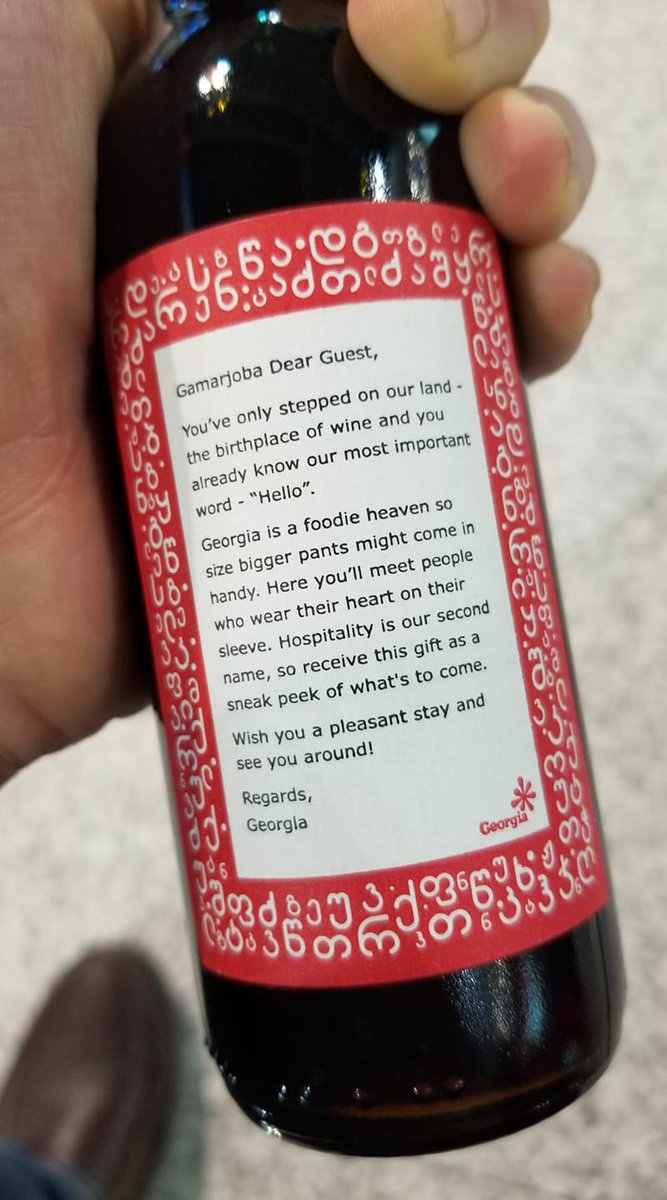Weekly Georgian Etymology: გამარჯობა gamarǯoba & #39;hello& #39;, from გამარჯვება gamarǯveba victory, triumph, from Proto-Kartvelian *ma-rǯv- overcome, defeat, from PK *rǯv- right, nimble. It illustrates the sometimes strange origins of the & #39;phatic& #39; speech we use to create social bonds.
The word appears in modern form surprisingly late, only in the 19th c, in works like those of the poet-bard Ietim-Gurji:
გამარჯობა, ჩემო თბილის ქალაქო,
დაკარგული შენი შვილი მოვედი
Hello, oh my city Tbilisi,
Long-lost, I your child have returned
გამარჯობა, ჩემო თბილის ქალაქო,
დაკარგული შენი შვილი მოვედი
Hello, oh my city Tbilisi,
Long-lost, I your child have returned
Greetings occupy a distinct place in linguistic literature, since they are usually considered to be & #39;phatic& #39;, propositionless speech: they do not describe anything in the world, but rather express emotional ties between speakers.
As such, they can evolve from many different parts of speakers& #39; experiences:
English hello < possibly OEng hǣlu & #39;salvation, health& #39;
Italian ciao < Venetian sciao < Med Latin sclavus & #39;[your] slave& #39;
Arabic سَلَام salām & #39;peace& #39;
English hello < possibly OEng hǣlu & #39;salvation, health& #39;
Italian ciao < Venetian sciao < Med Latin sclavus & #39;[your] slave& #39;
Arabic سَلَام salām & #39;peace& #39;
Over its history, Georgian has had a number of different kinds of ways to greet others. The oldest form attested is found in a 9th c translation of St John Chrysostom: გიხაროდენი gixarodeni, lit. & #39;joy to you!& #39;. This is probably a loan-translation of Greek χαῖρε.
Starting in Middle Georgian times, around the 11th c, we see other terms, including გათაყვანება gataq̇vaneba lit. & #39;worshipping& #39;, the Arab loan word სალამი salami (ca 1100), and მოკითხვა moḳitxva lit. & #39;asking after& #39; (ca 1400).
It is also in Middle Georgian times that the word for victory comes to be associated with greeting. In Rustaveli& #39;s Knight in the Tiger Skin (ca 1190), we see lines like:
ტარიელსცა უსალამეს, მას ალვისა მორჩსა ვით ხეს,
მიულოცეს გამარჯვება, ერთმანერთი მოიკითხეს.
ტარიელსცა უსალამეს, მას ალვისა მორჩსა ვით ხეს,
მიულოცეს გამარჯვება, ერთმანერთი მოიკითხეს.
Which when translated reads:
"They also greeted Tariel, like the bud of a poplar tree,
they prayed for his victory, and greeted each other."
"They also greeted Tariel, like the bud of a poplar tree,
they prayed for his victory, and greeted each other."
So, it is from this context of medieval chivalry that the modern greeting indirectly descends. Perhaps by virtue of this social hierarchy, it is also noteworthy that greeting in Georgian is not usually symmetrical: the greeter says one thing, the person greeted another.
The exact manifestation of this varies from speaker to speaker and period to period. In modern colloquial Georgian, the person being greeted with გამარჯობა gamarjoba usually retorts with გაუმარჯოს gaurmarjos, lit. & #39;may there be victory to it& #39;.
In somewhat more formal styles however another response might be გახლავარ gaxlavar, lit. & #39;I am at your ready& #39;. This originates in phrases like the Venetian one: მეც თქუენი მონა და მოსამსახურე გახლავარ mec tkveni mona da mosamsaxure gaxlavar. & #39;I am your slave and at your service.& #39;
In the modern language, the form with -ობა -oba predominates. This perhaps reflects sporadic dialectal sound-changes that shift /ve, va/ to /o/. Modern speakers are generally not aware of the original martial meaning of the word გამარჯვება gamarjveba, which is also still used.

 Read on Twitter
Read on Twitter


